|

On eBay Now...
\"7th Earl of Shaftesbury\" Anthony Ashley-Cooper Hand Written 2 Page Letter For Sale

When you click on links to various merchants on this site and make a purchase, this can result in this site earning a commission. Affiliate programs and affiliations include, but are not limited to, the eBay Partner Network.

\"7th Earl of Shaftesbury\" Anthony Ashley-Cooper Hand Written 2 Page Letter:
$104.99
Up for sale a RARE! "7th Earl of Shaftesbury" Anthony Ashley-Cooper Hand Written 2 Page Letter Dated 1861.
ES-7311 Anthony Ashley Cooper, 7th Earl of Shaftesbury KG (28 April 1801 – 1 October 1885), styled Lord Ashley from 1811 to 1851 and then Lord Shaftesbury following the death of his father, was a British politician, philanthropist and social reformer. He was the eldest son of The 6th Earl of Shaftesbury and his wife, Lady Anne Spencer, daughter of The 4th Duke of Marlborough, and older brother of Henry Ashley, MP. Lord Ashley, as he was styled until his father's death in 1851,[2] was educated at Manor House school in Chiswick (1812–1813), Harrow Oxford, where he gained first class honours in classics in 1822, took his MA in 1832 and was appointed DCL in 1841. Ashley's early family life was loveless, a circumstance common among the British upper classes, and resembled in that respect the fictional childhood of Esther Summerson vividly narrated in the early chapters of Charles Dickens's novel Bleak House. G.F.A Best in his biography Shaftesbury writes that: "Ashley grew up without any experience of parental love. He saw little of his parents, and when duty or necessity compelled them to take notice of him they were formal and frightening." Even as an adult, he disliked his father and was known to refer to his mother as "a devil". This difficult childhood was softened by the affection he received from the family housekeeper Maria Millis, and his sisters. Millis provided for Ashley a model of Christian love that would form the basis for much of his later social activism and philanthropic work, as Best explains: "What did touch him was the reality, and the homely practicality, of the love which her Christianity made her feel towards the unhappy child. She told him bible stories, she taught him a prayer." Despite this powerful reprieve, school became another source of misery for the young Ashley, whose education at Manor House from 1808 to 1813 introduced a "more disgusting range of horrors" Shaftesbury himself shuddered to recall those years, "The place was bad, wicked, filthy; and the treatment was starvation and cruelty." By his teenage years, Ashley had become a committed Christian and whilst at Harrow he had two experiences which influenced his later life. "Once, at the foot of Harrow Hill, he was the horrified witness of a pauper’s funeral. The drunken pall-bearers, stumbling along with a crudely-made coffin and shouting snatches of bawdy songs, brought home to him the existence of a whole empire of callousness which put his own childhood miseries in their context. The second incident was his unusual choice of a subject for a Latin poem. In the school grounds, there was an unsavoury mosquito-breeding pond called the Duck Puddle. He chose it as his subject because he was urgently concerned that the school authorities should do something about it, and this appeared to be the simplest way of bringing it to their attention. Soon afterwards the Duck Puddle was inspected, condemned and filled in. This little triumph was a useful fillip to his self-confidence, but it was more than that. It was a foretaste of his skill in getting people to act decisively in face of sloth or immediate self-interest. This was to prove one of his greatest assets in Parliament." Ashley was elected as the Tory Member of Parliament for Woodstock (a pocket borough controlled by the Duke of Marlborough) in June 1826 and was a strong supporter of the Duke of Wellington. After George Canning replaced Lord Liverpool as Prime Minister, he offered Ashley a place in the new government, despite Ashley having been in the Commons for only five months. Ashley politely declined, writing in his diary that he believed that serving under Canning would be a betrayal of his allegiance to the Duke of Wellington and that he was not qualified for office. Before he had completed one year in the Commons, he had been appointed to three parliamentary committees and he received his fourth such appointment in June 1827, when he was appointed to the Select Committee on Pauper Lunatics in the County of Middlesex and on Lunatic Asylums. In 1827, when Ashley-Cooper was appointed to the Select Committee on Pauper Lunatics in the County of Middlesex and on Lunatic Asylums, the majority of lunatics in London were kept in madhouses owned by Dr Warburton. The Committee examined many witnesses concerning one of his madhouses in Bethnal Green, called the White House. Ashley visited this on the Committee's behalf. The patients were chained up, slept naked on straw, and went to toilet in their beds. They were left chained from Saturday afternoon until Monday morning when they were cleared of the accumulated excrement. They were then washed down in freezing cold water and one towel was allotted to 160 people, with no soap. It was overcrowded and the meat provided was "that nasty thick hard muscle a dog could not eat". The White House had been described as "a mere place for dying" rather than curing the insane and when the Committee asked Dr MacMichael whether he believed that "in the lunatic asylums in the neighbourhood of London any curative process is going on with regard to pauper patients", he replied: "None at all". The Committee recommended that "legislative measures of a remedial character should be introduced at the earliest period at the next session", and the establishment of a Board of Commissioners appointed by the Home Secretary possessing extensive powers of licensing, inspection and control. When in February 1828 Robert Gordon, Liberal MP for Cricklade, introduced a bill to put these recommendations into law, Ashley seconded this and delivered his maiden speech in support of the Bill. He wrote in his diary: "So, by God's blessing, my first effort has been for the advance of human happiness. May I improve hourly! Fright almost deprived me of recollection but again thank Heaven, I did not sit down quite a presumptuous idiot". Ashley was also involved in framing the County Lunatic Asylums (England) Act 1828 and the Madhouses Act 1828. Through these Acts, fifteen commissioners were appointed for the London area and given extensive powers of licensing and inspection, one of the commissioners being Ashley. In July 1845, Ashley sponsored two Lunacy Acts, 'For the Regulation of lunatic Asylums' and 'For the better Care and Treatment of Lunatics in England and Wales'. They originated in the Report of the Commissioners in Lunacy which he had commended to Parliament the year before. These Acts consolidated and amended previous lunacy laws, providing better record keeping and more strict certification regulations to ensure patients against unwarranted detention. They also ordered, instead of merely permitting, the construction of country lunatic asylums with and establishing an ongoing Lunacy Commission with Ashley as its chairman. In support of these measures, Ashley gave a speech in which he claimed that although since 1828 there had been an improvement, more still needed to be done. He cited the case of a Welsh lunatic girl, Mary Jones, who had for more than a decade been locked in a tiny loft with one boarded-up window with little air and no light. The room was extremely filthy and was filled with an intolerable smell. She could only squat in a bent position in the room and this had caused her to become deformed. 1851) was the chief witness and opposed the suggestion that the certification of insanity be made more difficult and that early treatment of insanity was essential if there was to be any prospect of a cure. He claimed that only one or two people in his time dealing with lunacy had been detained in an asylum without sufficient grounds and that commissioners should be granted more not fewer powers. The Committee's Report endorsed all of Shaftesbury's recommendations except for one: that a magistrate's signature on a certificate of lunacy be made compulsory. This was not put into law chiefly due to Shaftesbury's opposition to it. Clarification needed The Report also agreed with Shaftesbury that unwarranted detentions were "extremely rare". n July 1877, Shaftesbury gave evidence before the Select Committee on the Lunacy Laws, which had been appointed in February over concerns that it was too easy for sane persons to be detained in asylums. Shaftesbury feared that because of his advanced age he would be taken over by forgetfulness whilst giving evidence and was greatly stressed in the months leading up to this: "Shall fifty years of toil, anxiety and prayer, crowned by marvellous and unlooked-for success, bring me in the end only sorrow and disgrace?" When "the hour of trial" arrived Shaftesbury defended the Lunacy Commission and claimed he was now the only person alive who could speak with personal knowledge of the state of care of lunatics before the Lunacy Commission was established in 1828. It had been "a state of things such as would pass all belief". In the Committee's Report, the members of the Committee agreed with Shaftesbury's evidence on all points. n 1884, the husband of Mrs Georgina Weldon tried to have her detained in a lunatic asylum because she believed that her pug dog had a soul and that the spirit of her dead mother had entered into her pet rabbit. She commenced legal action against Shaftesbury and other lunacy commissioners although it failed. In May, Shaftesbury spoke in the Lords against a motion declaring the lunacy laws unsatisfactory but the motion passed Parliament. The Lord Chancellor Selborne supported a Lunacy Law Amendment Bill and Shaftesbury wanted to resign from the Lunacy Commission as he believed he was honour bound not to oppose a Bill supported by the Lord Chancellor. However, Selborne implored him not to resign so Shaftesbury refrained. However, when the Bill was introduced and it contained the provision which made it compulsory for a certificate of lunacy to be signed by a magistrate or a judge, he resigned. The government fell, however, and the Bill was withdrawn and Shaftesbury resumed his chairmanship of the Lunacy Commission. Shaftesbury's work in improving the care of the insane remains one of his most important, though lesser known, achievements. He wrote: "Beyond the circle of my own Commissioners and the lunatics that I visit, not a soul, in great or small life, not even my associates in my works of philanthropy, has any notion of the years of toil and care that, under God, I have bestowed on this melancholy and awful question".


RARE “7th Earl of Carlisle" George Howard Hand Written Letter Dated 1846 $279.99

Charles Perceval 7th Earl of Egmont- Signed Historical Page $12.00
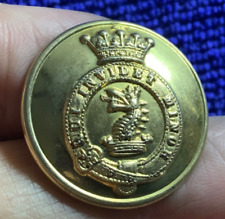
7th EARL (CADOGAN) of CULFORD HALL SUFFOLK 26mm GILT LIVERY COAT BUTTON 1933 NOS $47.50
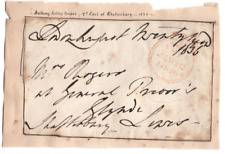
Anthony Ashley Cooper, 7th Earl Shaftesbury Signed Free Front / Autographed $19.99
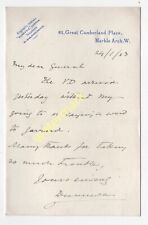
7th Earl of Dunmore, politician, explorer & artist, autograph letter, 1903 $25.24

7th Earl of Aberdeen, politician, autograph letter 1886 $25.24
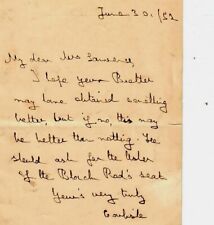
RARE “7th Earl of Carlisle" George Howard Hand Written Letter From 1852 COA $104.99
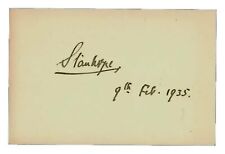
RARE "7th Earl Stanhope" James Stanhope Hand Signed 3.5X2 Card $349.99
|